Photo

As it's coming up to Bonfire Night in the UK, let's talk about Fireworks! Many of us love to celebrate Bonfire Night with hot cider, sparklers, toffee apples and of course, the firework display. But for many, fireworks can be a trigger: frm those with PTSD and mental health difficulties, to those with light or noise sensitive migraines and seizures (and let's not forget that our pets aren't keen on fireworks either!) There are plenty of ways to still get into the spirit of Bonfire Night without triggerring symptoms for those who do struggle. Here's how to be respectful to those around Bonfire Night: The ideal is to only attend public showings, rather than using them in your private gardens. This helps people to prepare exactly when and how long to expect fireworks so they can put safety measures in, or ensure they're far enough away from the showings. However, if you MUST have private showings, please follow these: - Don't set them off privately on days far from Bonfire Night itself (ideally only Bonfire Night and/or the closest weekend). This again helps people to prepare, and limits the amount of nights they are having to be triggered. - Let your neighbours know if you're going to be setting them off in your garden. This is just respectful, but also means that those who will really struggle being that close to them have the opportunity to get away from the home, or if they can safely, prepare at home. - Use silent alternatives. Those who are triggered by the sound are protected by these. - Use in big open spaces, such as feilds and countryside. Not only is this far safer, they are also less likely to feel as loud or bright without the echo and darkness of enclosed spaces, and there may be less people around. - Adhere to the noise cut off regulations of your local area. People who are affected by fireworks deserve to know that after a certain time, the noise will stop, rather than continuing throughout the night. For me, Fireworks are a trigger for my seizures due to sudden loud noises. I am also triggered by flashing lights, and therefore would have to be inside before it got dark and wear earplugs constantly in case I heard or saw a firework. (at Guy Fawkes Bonfire Night) https://www.instagram.com/p/CVqZvrNMBMB/?utm_medium=tumblr
0 notes
Photo

Every year at halloween, we see an influx in ableism as people choose to dress up to present a particular difficulty, or assume that our disabilities are part of a costume. Halloween (particularly in the UK) is a family friendly occasion that appeals a lot to children; no child should be surrounded by people portraying disabilities as scary. For visibly disabled children, they should not be made to feel as if the way that they look, walk, talk or act is undesirable, scary or the punchline to some hideously misjudged joke. The work that disabled people do to normalise disability is too often stripped away on events where people intend to look "scary" "ugly" or "funny" - from people presenting as having a limb difference, scars or skin differences, mobility aids, mental illnesses, or change the way in which they act to portray a harmful stereotype of disabled people. There are so many cool halloween costumes that won't cause offence or aid in a step backwards away from the normalisation of disability. Zombies, witches, skeletons, pumpkins, clowns, characters from movies, or even some light-hearted mario and luigi couples costumes! As Halloween comes up, please don't dress up to portray disabilities, visual differences or mental illnesses to look "scary" #Accessibility ID: green background with cream text reading "Disabilities are not costumes" and red text reading "why not try these costumes instead?". below is an image of a witch/wizard hat, a skeleton and a pumpkin. https://www.instagram.com/p/CVLewRms1Z2/?utm_medium=tumblr
4 notes
·
View notes
Photo

"Don't let your disability stop you" This quote, or words to the same effect, is something I see far too often and it's ableist BS (excuse my language). We're too often told that we shouldn't let our disability stop us, but why shouldn't we? Why should we 'push through' something that will cause us horrific symptoms that could last weeks? We don't have to meet abled people's expectations, and we certainly don't have to have the same expectations of ourselves that abled people do of themselves. It's okay if you can't do the laundry for weeks, or if you can't work, complete an academic course and join a social club in the same year. It's okay to make the decision to not do something because of your health, in fact, I would encourage it! Putting your health first is NOT giving up. Here's some things I have given up that have benefitted my health: - My education - my health was deteriorating massively because my brain and body were under too much strain - Sticking to a rigid sleep schedule - I wasn't listening to what my body needed, which only resulted in more pain and fatigue - Telephone calls - processing auditory information over the phone was far more stressful and less manageable than emails - Excusing friends' poor treatment of me - I spent too many hours coming up with reasons why they would do what they do - Medications with negative side effects - if something hurts me more than helps me, it's not beneficial for my health - Walking long distances - I can physically walk, but the agony, exhaustion and impact on my body isn't worth it - Hoping that I will get better - this only limited my ability to accept my disability and create a lifestyle that suited me What have you given up that has benefitted your health? https://www.instagram.com/p/CUtz-PksvNa/?utm_medium=tumblr
206 notes
·
View notes
Photo
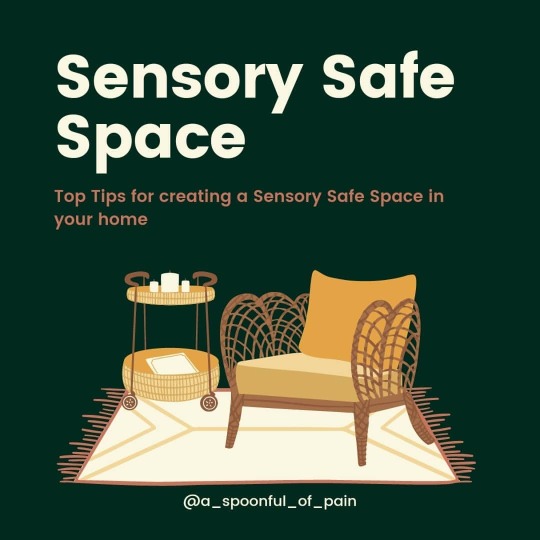
How to Create a Sensory Safe Space As promised, here is a follow on from my post on Sensory Triggers Let me know if you try this, and what things help you to feel less overwhelmed by sensory stimuli! I can't wait to hear everyone's experiences! (at Home Sweet Home) https://www.instagram.com/p/CUZVip5MG4-/?utm_medium=tumblr
0 notes
Text
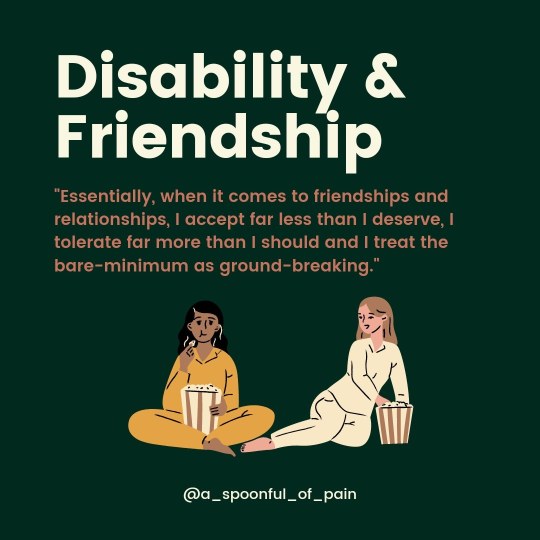
I've always took pride in how self-confident I am. But recently, I am starting to wonder whether I value myself less when forming friendships, and continue to go above and beyond for people when they won't even meet me halfway. I guess this is tied up with some internalised-ableism: the thoughts that I am a difficult friend because I am disabled creep in subconsciously. After having some time to reflect, I'm beginning to realise that I would put more effort into relationships and friendships as I felt that that made up for the difficulties and inconvenience I caused by being their sick and disabled friend. I would overly appreciate the bare minimum accomodations they made for me as if they were going above and beyond, and anytime that they treated me negatively, I would justify it by assuming that they were stressed out by my health difficulties being such an inconvenience in their life.
This meant that often I would excuse and overlook behaviour that honestly wasn't acceptable. I do require a certain level of care from anyone I form a friendship with (including access assistance, reaching things, etc.). This minimal care makes me feel indebted to them. I will have thoughts like "I can't be mad at them because they kept me safe during a seizure" and "it's okay that they've been avoiding me because it's hard work having a disabled friend".
Essentially, when it comes to friendships and relationships, I accept far less than I deserve, I tolerate far more than I should and I treat the bare-minimum as ground-breaking.
After speaking to others with a disability, I know I am not alone in this.
So I want to say this: we are deserving of good friendships. Of course, it's important to acknowledge that a relationship that involves a lot of care can be challenging for the carer and the disabled person, and I in no way want to diminish that.
We do not deserve to be treated as less than because of our disability. We have a right to tell someone when they are hurting us, regardless of how much they do to support us.
We are worthy of real friendship.
What have your experiences with friendship and disability been? Can you relate?
Let me know in the comments below ⬇️⬇️
#Accessibility ID: green background with cream text reads "disability and friendship" brown text reads "essentially, when it comes to friendships and relationships, I accept far less than I deserve, I tolerate far more than I should and I treat the bare-minimum as ground-breaking" below is an image of two women in pyjamas sat down eating popcorn.
38 notes
·
View notes
Photo
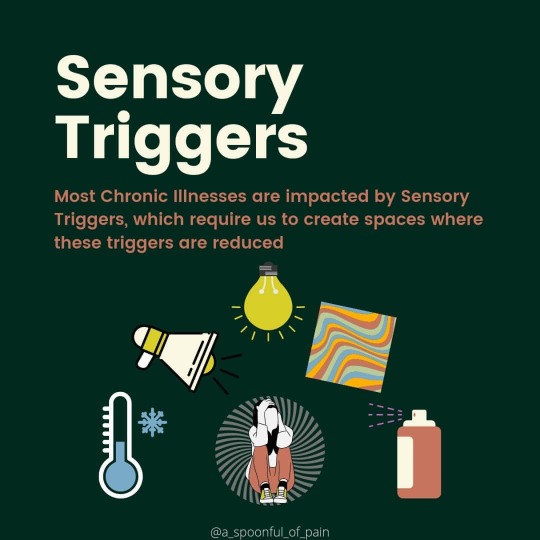
Chronic illnesses make me particularly sensitive to a lot of stimuli, so I have to make a lot of adjustments in my life to make things work for me in the least painful and triggering way. For me, this looks like having complete control over the lighting, visual stimuli and sounds in my safe space, tailoring my wardrobe to have clothes that don't upset my skin, and using only a very select few products on my body / in my safe space. I'm most sensitive to visual stimuli (particularly natural sun light, overwhelming colours / patterns and 'stuff'). This means my safe space is always clutter-free, with a blackout blind, and dim lighting. When I am home alone, this is easy to control, however when I have guests I always get overwhelmed by the increase in mess, even when they are trying to be tidy. It often comes across rude as I tidy their coats away but I can't listen to them when I'm so overwhelmed. This is the same with scents such as strong perfumes, scented candles or room fragrances. I've had the same deodorant and perfume for so long because changes in scent can be a pain trigger for me. Similarly if other people are wearing strong scents. I'm unable to focus on more than one sound at a time, so can't have a conversation if music is playing, and when I'm shopping I find the background music so loud. I listen to most things with quiet volume and subtitles, and loud noises can trigger both pain and seizures for me. (if someone gets a power tool out, you can guarantee I'll have a seizure!) I find certain fabrics painful to wear (denim, wool, rough fabrics) and seams, buttons and tight waistbands also hurt. My wardrobe is made up of super soft oversized clothing, that suits my needs. My environment is one of the few things I do have control over (in most situations), and when I live in a body I have absolutely no control over, I need that safe space to get some relief. Not everyone with sensory issues is autistic, and when we say that something hurts, we are serious. It may seem bizarre, but lights, sounds, smells, touch, tastes, chemicals, water, temperature, clutter and mess can actually cause *physical* pain. https://www.instagram.com/p/CUGB52XMWHe/?utm_medium=tumblr
47 notes
·
View notes
Photo
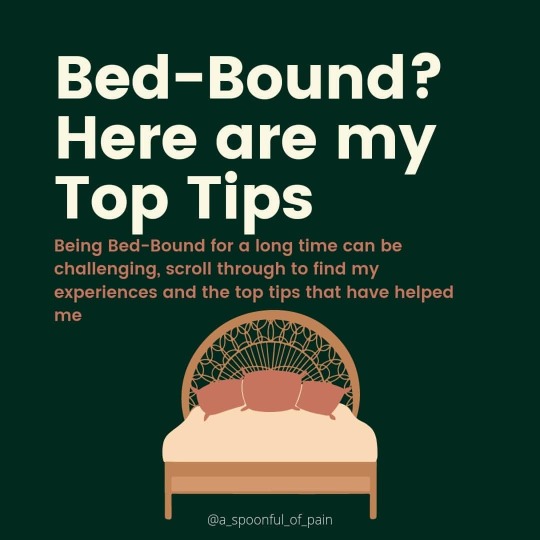
I have now been bed-bound for 8 months, and when I say bed-bound I mean the only times I have left my bed are to use the bathroom, to go to hospital, and the few minutes where my mum changes the bed linen. As a chronically ill and disabled person, this is something I've experienced before but to a much shorter extent (no more than a couple of weeks). So, I took to the internet in the search for tips for being bed-bound, and I came back with na-da! So if you're currently bed-bound, swipe through the top tips I've learned in the past 8 months. Most importantly, remember that you are not a burden and this is not your fault. Your body needs time to rest, and it is okay to let it. You are not alone in this, there are many people out there who are or have been bed-bound for long periods (we're all just too knackered to write a post about it!). Comment below anything you have found helpful when you're bed-bound, let's share our expertise! Save this to remind yourself!💾 ID in comments https://www.instagram.com/p/CTz4BE6svrt/?utm_medium=tumblr
11 notes
·
View notes
Photo

Awarding full-time attendance, particularly in schools, teaches children from a young age that academic success is far more important than health, be that physical or mental. This is a dangerous lesson as children will learn to dismiss their symptoms instead of getting the support they need. Rewarding those with 100% attendance punishes those without and therefore children are conditioned to believe that being unwell is a punishable, undesired offence.
You shouldn’t be proud of 100% attendance. Having 100% attendance tells me a lot about you (and it’s not that you’re super reliable). 100% attendance means that you attended your education / employment setting whilst carrying an infection that could be life threatening to those with autoimmune conditions. It means that you prioritise work/study over health, which at some point will probably backfire. No one is totally healthy physically or mentally every single day of the year, and ‘pushing through it’ benefits nobody; pushing through it can put others at risk if you are infectious, and puts yourself at risk.
Attendance awards are dangerous, but they’re also ableist.
Many disabled people will not ever achieve full attendance in anything, for so many reasons. Their symptoms may flare resulting in too much pain, fatigue etc. to attend school safely. The access within the education / employment setting may not be good enough for them to access everyday. Not to mention needing to attend vital medical appointments.
It’s important to note that this doesn’t always have an impact on academic ability. Many disabled people choose to work or study from home if this is accessible to them, and as long as this option is available to them, their attainment is less likely to be affected. Disabled people are also experts in catching up with things they have missed due to their days off!
Rather than rewarding 100% attendance, why don’t we celebrate those who prioritise health and well-being? That’s an award I could get behind.
https://www.instagram.com/p/CSUojrYsSO0/?utm_medium=tumblr
#Accessibility ID: Green background with cream text reading "Attendance Awards are Ableist", brown text reads "Awarding 100% attendance is dangerous" . Below is an image of a yellow rosette with 100% written across the middle.
#disability#disabled#disabled tag#school#ableism#wheelchair#disabledlife#disabled woman#chronic pain#chronic illness#functional neurological disorder#complex regional pain syndrome#fibromyalgia#ableism sucks
12 notes
·
View notes
Photo
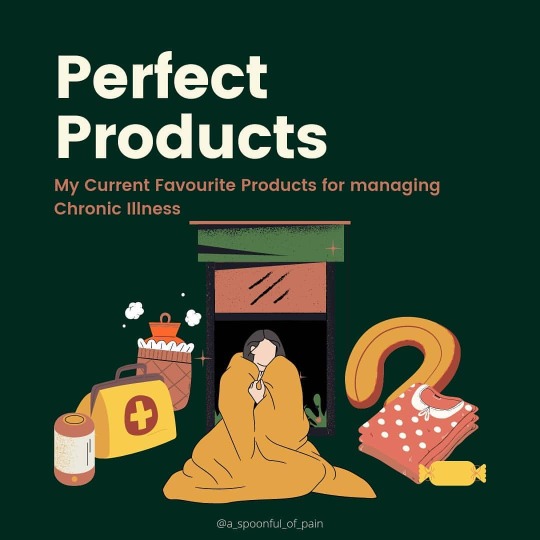
My top favourite products! Smart Home Products I love being able to control as much as I can with my voice, so I can avoid screens and movement where possible. Vivo Electric Hot Water Bottle. Filling up a hot water bottle is tricky with weakness and pain, not to mention can be dangerous! But you can get a hot water bottle that you just plug in, no filling with boiling water. Dreamland Heated Throw If heat helps your symptoms, this blanket is amazing. It's like your typical soft blanket we wrap up in, and it heats up! I've used this every single day for 4 years, and I have multiple for different rooms. Gin-Gins Ginger Candy If you struggle with nausea, these are perfect. I suck them rather than chew and they just melt in your mouth. They come wrapped individually so would be handy to take out with you for quick nausea relief. Kool N Soothe Headache Patches If you deal with migraines or headaches, these cool patches are great for managing pain. Also if you get hot flushes, or tend to overheat, they are a great way to cool you down. The Gro Company Gro Anywhere Blind I have never been able to find blackout blinds or curtains that actually do stop the light from coming in, and as someone with photophobia, that's a big problem. This blind uses suction cups to stick directly to the window, meaning literally no light can escape AND it doesn't damage the window. It's so easy to take on and off too, and is adjustable so fits a big range of window sizes. Magic Gel Wrap Around Ice Pack Before I bought this, I would use frozen peas wrapped in a tea towel - not ideal. This has made using ice so much easier, the gel packs fit in a soft pouch and has a long elasticated strap so you don't even have to hold it in place yourself. 'Pregnancy' Full Body Pillow Having a supportive nights sleep should not only be reserved for pregnant people! Having support all around my body helps me to sleep with less pain. Primark Pyjamas Primark has a range of pyjamas that are amazingly soft, they're so dreamy! They're the comfiest sets in existence, through all my searches for soft pyjamas I've never found a better option. https://www.instagram.com/p/CSM_pp9s0Xf/?utm_medium=tumblr
4 notes
·
View notes
Text
As most of you probably noticed, for the last week of Disability Pride Month, I had a Q&A on my stories about Disability Pride Month. This brought up a lot of interesting questions, that I want to address on a post. You can see the Q&A on my highlights if you're interested in reading more!
It doesn't matter how we support Disability Pride Month, as long as we do support it in some way. It's okay if you didn't start a protest or share every little thing you saw about Disability Pride Month, you can support it in any way that suits your abilities! Just because Disability Pride Month is coming to an end, we will not stop fighting until we have equal rights and don't have to feel grateful for an accessible bathroom!
Happy Disability Pride Month 2021!
#Accessibility ID: green background with white text reads "Disability Pride Month - a summary" with brown text reading "a summary of a week-long Question and Answer session about Disability Pride Month (DPM)" Below is an image of two people from the waist up.The first is wearing a khaki hijab and mustard jumper, and is doing sign language, the second has a short white bob and a red top, she has no arms.
What's one thing you wish others knew about disability?
This feels impossible to answer, because there isn't just one thing I wish others knew about disability. In my opinion, I feel it can mostly be summarised with "we do not have equality". I think most believe that because we have a law in place to protect us, we are treated equally, but this is not the case at all. You can check out my first post about Disability Pride Month or my blog "Why we need Disability Pride Month" for more information about the statistical inequalities. I was also asked "what law would you want to put in place for disabled people?" The law itself is in place in the UK (The Equality Act 2010) but it is not enough to protect disabled people because it's not easily punishable and is far too open to interpretation.
Do you know of any businesses / brands supporting Disability Pride Month?
When I was originally asked this, my answer was no. In stark contrast to the LGBTQ+ Pride Month that just finished, Disability Pride Month wasn't advertised and supported anywhere. But some of my fabulous followers have sent me a couple of brands who did do something: Pretty Little Thing, BPerfect Cosmetics and Innocent. I really admired the honesty of Innocent's post regarding Disability Pride Month and I urge you to check it out. Innocent acknowledged that they weren't originally aware of Disability Pride Month, but not only this, they also listed their flaws regarding disability equality and what they were doing to change these. This, to me, felt far more important than sticking the flag on a product without doing anything to support disabled people. But a tiny percentage of brands doing something is not enough, I mean come'on Ikea made LGBTQ+ Pride sofas - where's our sofa?!
What's one prejudice you have about Disability?
I loved this question, because it's so important to acknowledge that even disabled people can have an uncnoscious bias or prejudice surrounding disability - we're not perfect! For me, I need to work on my initial judgement of people who are not visibly disabled using disabled facilities. When I've been waiting for the accessible bathroom for ages, and a seeminly perfectly healthy person walks out, I do initially think to myself "they're not disabled, they're taking advantage of the facilities", same when I can't park because all the accessible parking spaces are taken up. I know that there are invisible disabilities, and without my mobility aids, I look perfectly healthy too so I know how frustrating it is to get the judgemental looks. I always correct my thoughts, and remind myself that they could be invisibly disabled, but in that moment of frustration, I definitley make a judgement based on the way they look. It's not right, and I'm working on changing that initial thought by correcting myself every time.
Should abled people be supporting Disability Pride Month?
Abso-bloomin-lutely! We need allies to support us with our fights, because the more people we have speaking up, the louder our voice will be. There are so very few disabled people who have big followings and/or big influence (which is an issue in itself) so we need more abled people to get behind us to help raise awareness and make change. We also know that 19% of working age adults in the UK have a disability which is around 1 in 5, so every abled person is going to know a lot of disabled people, whether they know it or not! As long as you're sharing the messages that disabled people want to be shared, please do support us.
What have I learned during Disability Pride Month?
I've been trying to educate myself more on the expereinces of disabled POC, as this is something I've been regrettably ignorant about. @ChronicallyBrown @DopeBlackDisabled @GirlsChronically_Rock on Instagram have been great resources for this, so give them a follow! I have learnt about the additional fears and discrimination disabled POC face, including the shockingly high statistics of black disabled people who have lost their lives to police brutality. This is something I would urge everyone to educate themselves on; we have been made more aware of racism since the BLM movement, yet we didn't hear as much about the intersectionality of disabled poc, and the discrimination they face.
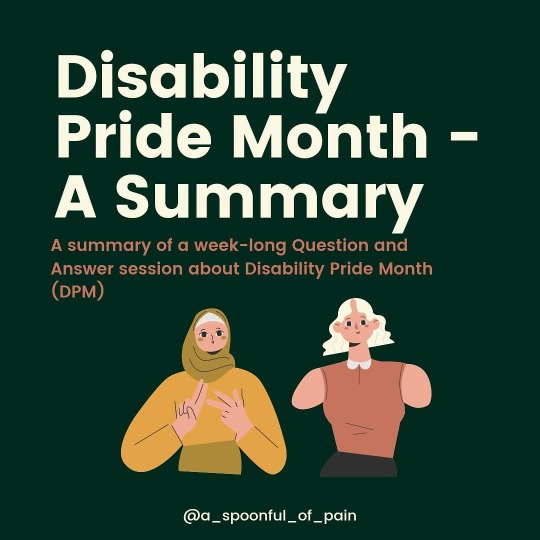
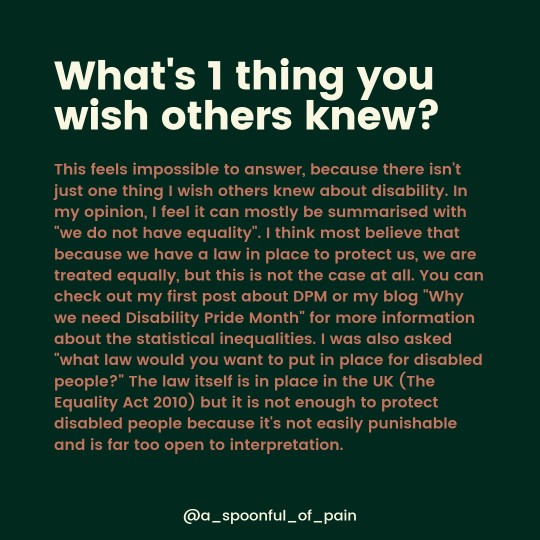




#disability#disabilityactivism#disabilityactivist#disabilityrights#ableism#fibromyalgia#chronic pain#accessibility#chronicillness#chronicpain#disabilitylife#disabilitypride
7 notes
·
View notes
Photo

I've been trying to think of a caption to emphasise this point but honestly I feel like "Flash Warnings Save Lives" is enough. TRIGGER WARNING- d*ath Here's a little bit more detail, if you're interested. Flash Warnings are not just there to protect those with epilepsy! Flashing lights mainly affect those with seizure disorders (including non-epileptic attacks), but can also affect people with visual disturbances / disabilities, sensory disabilities and probably more! In some cases, seizures can lead to physical injury, long-term lasting effects and d*ath. For those with visual disabilties, they may cause migraines or a worsening of symptoms, and for those with sensory disabilities, it may cause them to go into sensory overload. I recently had an experience where a video was shared by a well-known UK business that caused me to go into a seizure that resulted in me falling off the bed and injuring my head, neck and back. Of course, I messaged the company and asked for it to be removed but it was too late. There's even law / guidance to protect us! The guidelines put in place by the World Wide Web Consortium (W3C) state that videos should NOT be posted if they contain anything that flashes more than 3 times in any 1 second period. These are the international standards, and therefore breaking these guidelines could be classed as unlawful. It is illegal to discriminate against disabled people, which includes those with seizure disorders, and not following these guidelines is considered a form of discrimination. If the video must have flashing lights for any reason that is completely unavoidable, and there is no flash warning before the video is played, they may be breaking the law. So please, the next time you consider sharing a video with flashing lights, think. • Is the flashing necessary? • If so, is there a clear trigger warning? Please share this post! https://www.instagram.com/p/CR9ZrGSsDgr/?utm_medium=tumblr
5 notes
·
View notes
Photo
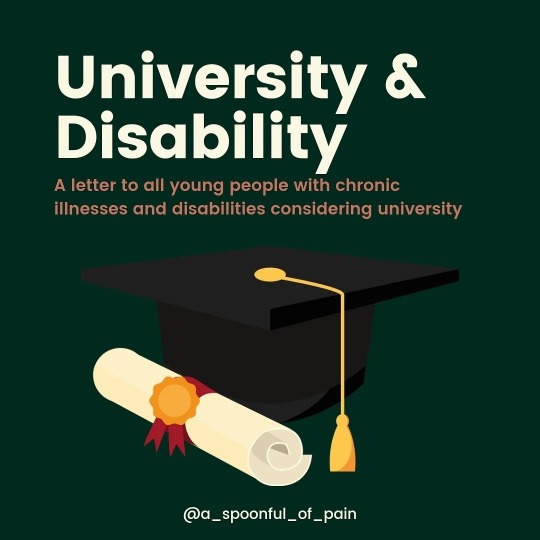
To all the young people with chronic illnesses and disabilities, This is for you. Love, Al ❤️ https://www.instagram.com/p/CRra5iCMSDR/?utm_medium=tumblr
1 note
·
View note
Text
Do they want a bag?
This happens far too often. If a person has a visible disability, members of the public sometimes assume that this means they are unable to communicate typically. They therefore speak to the people around them (whom they assume are carers) rather than the disabled person themselves.
This is ableism.
First of all, there is an assumption that visibly disabled people cannot communicate verbally.
- This is NOT the case. Although some may have difficulties with communication, it is not okay to assume this purely from the way somebody looks.
Secondly, there is an assumption that the people around the disabled person are carers.
- Again, NOT always the case. Some people have carers, and some simply have friends and family (crazy right, I know).
The best way to communicate with a disabled person is to communicate WITH the disabled person. If they are not able to respond to you verbally or cannot understand you, they will often have ways of expressing this to you.
I'm told a lot of people don't talk to disabled people because they're worried of being embarrassed if the person cannot communicate back. To this, I would like to note that many disabilities are invisible and therefore you wouldn't even know if you were speaking to a disabled person or not! It's not a fear of embarrassment, it's outright ableism. #ipreview via @preview.app
#Accessibility ID: Green background with cream text reading ""Do they want a bag?"". Below in brown text reads "Assuming disabled people are unable to communicate is ableism". An image of a tall pink and short brown shopping bag are below.
#Disability #DisabilityRights #DisabilityActivist #DisabilityActivism #DisabledAndCute #Ableism #Wheelchair #DisabilityInclusion #DisabilityPride #DisabilityLife #DisabilityAdvocate #WheelchairUser #ChronicPain #FND #ChronicIllness #Fibromyalgia #CRPS #DisabilityLife #AbleismIsTrash #AbleismExists #Lockdown #Undiagnosed #DisabledAnd #InvisibleIllness #DisabledAndProud #MentalHealth #FreedomDay
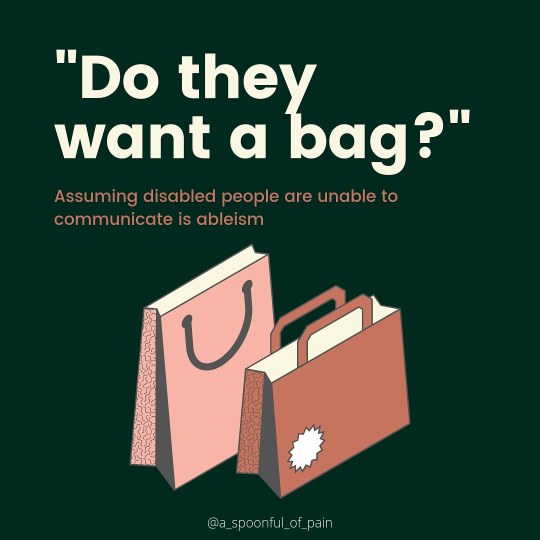
4 notes
·
View notes
Text
Lockdown gave abled people the opportunity to experience some of the things disabled people have been experiencing their whole lives. This resulted in a lot of contradictory statements...
Disabled people were often scolded for spending so much time on social media / on our phones, yet when lockdown came, everyone realised the value of technology to keep in touch,
Disabled people were told they were lucky that they could spend so much time in bed, yet when lockdown came, mental health illness cases rose because people had to do just that.
Disabled people were laughed at for suggesting socialisation virtually with friends and family, yet when lockdown came, group calls and virtual family quiz nights held relationships together.
Disabled people were rejected when asking for the flexibility and accomodations to work from home, yet when lockdown came, these accomodations were easily made.
Disabled people asked for virtual doctors appointments and were told it wasn't possible, yet when lockdown came, it was the only option.
Disabled people were crammed into crowded places causing accessibility issues, yet when lockdown came, social distancing improved access.
Disabled people requested more online shopping and deliveries for essentials, yet when lockdown came, this was seen as a necessity.
Disabled people who wore masks before Covid were mocked, yet when lockdown came, wearing a mask was enforced.
Disabled people were met with jealousy when they stated they were unemployed, yet when lockdown came, many realised the true struggle of not having anything to occupy their time.
The hypocrisy of the abled people who would mock, deny and minimise the disabled experience who were then forced to live in a similar way needs attention. I hope that there is more compassion now. I hope that knowing the changes and accomodations disabled needed are possible results in more accomodations being made. I hope that companies choose to continue to support those with disabilities, even if that was never their intention. I hope that something good could come out of this devastation.
Comment below any more Covid contradictions you can think of!
ID: green background with cream text reads "covid contradictions" brown text reads "disabled people often asked for requirements that were rejected, yet during the pandemic, these became essential." Below is an image of a white woman wearing a yellow coat and brown mask.
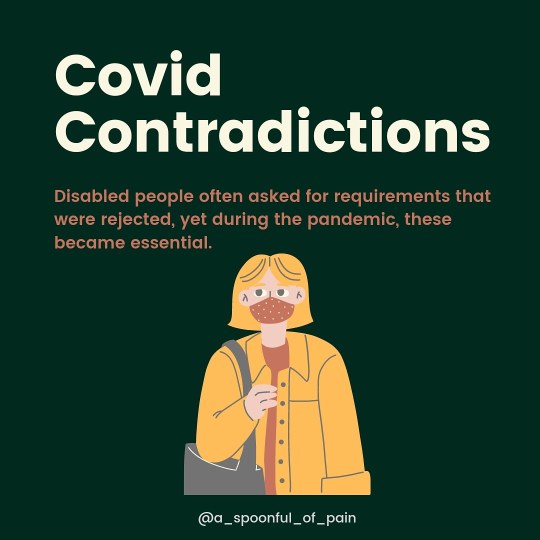
#disability#disabilityactivism#disabilityactivist#disabilityrights#ableism#disabled#spoonie#chronic pain#fibromyalgia#life
15K notes
·
View notes
Text
July is Disability Pride Month which is a great time for disabled people to come together and celebrate their disabilities, however it's also important that we use Disability Pride Month to motivate change within our society and raise awareness of the inequalities disabled people face on a daily basis.
This Disability Pride Month, here's 5 things you need to know:
1. Disabled People do not have marriage equality.
2. Disabled People are far more likely to be victims of abuse.
3. Disabled People make up 15% of the World's Population
4. Disabled People are around twice as likely to be unemployed.
5. Disabled People Face Extra Costs of £583 Per Month
Of course, there are a lot more inequalities than the ones listed here, and these have only increased with the recent treatment of disabled people during the pandemic. As disabled people, we will continue to fight for our rights and equality, and hope that abled people will support us in this.
Disability Pride Month is far less celebrated and publicised than other (equally important) pride events, which unfortunately means it has less of an impact than others. For example, during LGBTQ+ Pride Month, many brands and businesses promoted the month with limited edition products and events, which in turn raises awareness and helps to encourage change.
If you're abled and reading this, here are just a couple of things you can do to support Disability Pride Month:
- Listen to the experiences of disabled people and their stories. Awareness is the start of change.
- Boost disabled people's voices. Share their posts on Social Media or tell your friends and family about the inequalities disabled people face.
- Educate yourself. Do a quick search on Social Media or Google to learn more about Disability Pride Month, find out the meaning behind the flag or the history behind Disability Pride.
- Hold yourself accountable. Be aware of your privilege, ignorance and unconscious bias.
Image Descriptions:
Slide 1:
Green background with white text reading "Disability Pride Month". Below in brown text reads "5 things you should know about Disability Pride Month". Below is an image of a brown woman using a wheelchair with one arm raised in a fist and the other holding a megaphone. An image of a white woman with a prosthetic leg stands beside her, holding the Disability Pride flag above her head with one arm. The flag has a black background with zig zag multicoloured stripes going diagonally from the top left to the bottom right corner.
Slide 2:
Green background with white text reading "Disabled People Do Not Have Marriage Equality". Below, brown text reads "If a disabled person chooses to get married within the UK, they are at risk of losing their financial support, and many are encouraged not to get married or cohabit in order to maintain financial stability. Although the disability benefit in the UK is unaffected, any benefits that are means tested will be impacted by sharing a home with a partner. Therefore those who are unable to work due to their disability will lose their financial support if they cohabit, with the assumption that the partner will make up for the lack of income." Cream text centered below reads "Disabled people often feel they have to choose between marriage and financial security"
Slide 3:
Green background with white text reading "Disabled People Are More Likely to be Victims of Abuse". Below, brown text reads "Statistics found that 14.3% of disabled people were victims of domestic abuse last year, compared to 5.1% of abled people (ONS, 2020). With disabled people almost three times more likely to be victims of abuse, it is clear that they are significantly more vulnerable. In 2017/18 only around 10% of violent hate crimes against disabled people resulted in a charge or summons." Cream text centered below reads "Not only are disabled people more likely to be victims of crime than abled people, these crimes are very rarely punished by law."
Slide 4:
Green background with white text reading "Disabled People Make Up 15% of the World's Population" Below, brown text reads "It is more likely that this statistic is a lot higher, as many disabled people are not registered disabled due to lack of diagnosis, familial and societal discrimination, and many other factors. In the UK, there are 14.1 million registered disabled people. 19% of working age adults in the UK are disabled, that is almost 1 in 5. Nobody is immune from disability, yet so many abled people don't fight for disability rights because they believe it doesn't impact them." Cream text centered below reads "Disability can happen to anyone at any time."
Slide 5:
Green background with white text reading "Disabled People Are Around Twice As Likely to be Unemployed" Below, brown text reads "As well as the questions this raises about inaccessibility and discrimination in the work place, it also reiterates the financial issues that arise from being disabled. Although it is illegal to reject a person's job application due to their disability, it is far too easy to blame the rejection on something else, so it is almost impossible to prove that employment was denied based on disability." Cream text centered below reads "Employed Disabled People often experience a significant amount of ableism within the workplace."
Slide 6:
Green background with white text reading "Disabled People Face Extra Costs of £583 Per Month" Below, brown text reads "On average, it costs £583 a month MORE to be disabled, with 1 in 5 disabled people facing over £1000. Considering the disability employment and pay gap, the failing benefits systems and marriage inequalities, disabled people are already at risk of poverty. For anyone who believes disabled people have equality - just imagine having to pay out an extra £583 a month purely because you have a disability / health condition." Cream text centered below reads "The financial support from the government rarely covers these costs."
Slide 7:
Green background with white text reading "How to Support Disability Pride Month as an Ally" Below, brown text reads "Listen to the experiences of disabled people and their stories. Awareness is the start of change. Boost disabled people's voices. Share their posts on Social Media or tell your friends and family about the inequalities disabled people face. Educate yourself. Do a quick search on Social Media or Google to learn more about Disability Pride Month, find out the meaning behind the flag or the history behind Disability Pride." Cream text centered below reads "Hold yourself accountable. Be aware of your privilege, ignorance and unconscious bias."
Slide 8:
Green background with white text reading "Disability Pride Month is a Celebration" Below, brown text reads "Disability Pride Month isn't all negative. It is an opportunity to come together to share experiences, raise awareness and celebrate why we are PROUD to be Disabled." Below is an image of a brown man with no visible disability wearing striped trousers holding hands with a white woman sitting in a wheelchair wearing a yellow dress. They are facing eachother with their free hands pointing up to the text above it.


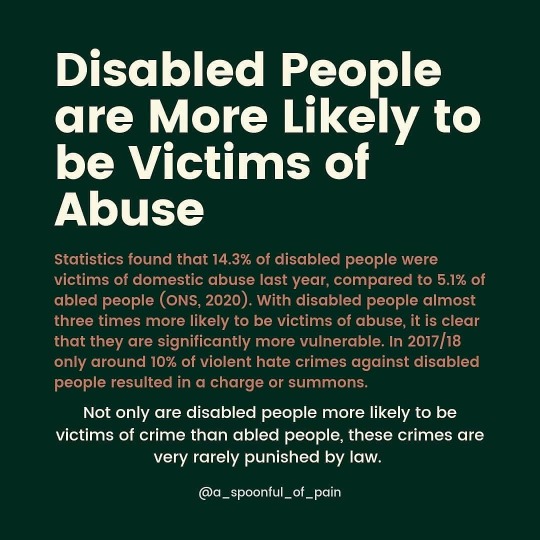


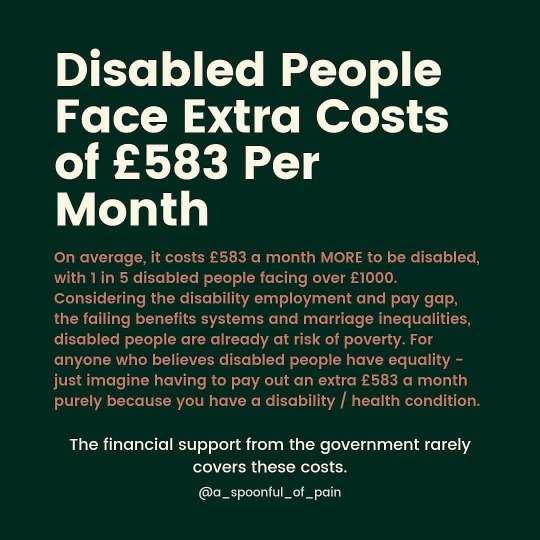


11 notes
·
View notes
Text

I don't know about you, but I have a much clearer head when I have a tidy home. Don't get me wrong, I know this isn't an easy task. The motivation, the energy and the ability to tidy is not something everyone has. But I have a few tips to help keep your space calmer when you're feeling overwhelmed by the things around you:
- Ad-break tidy! Watch a TV channel with ads, and then every time an add comes on, use that time to tidy up. As soon as the ad break finishes, you should be back on the sofa. I love this technique because it helps me to pace
- Bedside table tidy! When I'm spending the majority of my time in bed, my bedside table becomes a mountain of rubbish: food wrappers, medicines, empty water bottles and mugs. If you're not feeling well enough to tidy a whole room, tidy that one spot you use the most.
- Hiding tidy! if you're feeling really overwhelmed with the things scattered around your home, and you really can't manage, try hiding the clutter in a box or cupboard, ready to be sorted when you're feeling well enough. Out of sight, out of mind.
- Basket tidy! Have a basket in every room to put items in that need to leave that room. When you come to tidy, everything that needs to move to different rooms will be in one place and your room will look less cluttered!
These are just some of my top suggestions for easier tidying to create a calm space. Comment your top tips below!
#Accessibility ID: Green background with white text reads "Tidy Space, Tidy Mind", below brown text reads "Top Tips for Tidying your space with Chronic Illness". Below the image is split into 4. In the first section is an image of a television on a cream stand, with text reading "Ad-Break Tidy". The second section has an image of a bedside table with a plant and clock sat on top, below text reads "Bedside Table Tidy". The third section shows an image of a storage unit made of stacked cubes in a triangular shape, below is the text "Hiding Tidy". In the last section is an image of a basket with a curved handle and the text "Basket Tidy". All images are in pale muted pink colours.
5 notes
·
View notes
Text

Today is a more personal post, but one that I feel is important.
I have been disabled for the majority of my life, and with each new symptom came a new learning curve so I am used to finding a way to adjust my lifestyle in order to manage.
I was in no way prepared for what came this time.
I won't go into details about symptoms as this may be triggering, but as a result of these symptoms, I have been left bed-bound. I have recently been told that these new symptoms are likely to be chronic and untreatable/unmanageable.
Being bed-bound for this length of time is the most challenging experience I have had with my health, and it's only getting harder as time goes on and my condition deteriorates. I struggle to keep myself occupied, I am unable to carry out really basic tasks, and it's had a massive impact on my relationships with friends and family. I have spent a lot of time researching and have found so few people talking about their experiences of being bed-bound (let's be honest, that's probably because we're all too unwell to talk about it!) so it's hard not to feel stuck without any advice on how to manage long-term bed-bound.
As I've been told there is no treatment available for me, I'm beginning to think about the impact that this will have on my life. Since becoming this unwell, I've been waiting to get better so that I can continue with my life, but knowing this is chronic puts a stopper in that one! So, although of course I'm still looking management and support for my symptoms, I am now begining to accept this as my new normal. Hopefully not forever, but for the foreseeable future.
Sometimes disability / illness anniversaries are hard to celebrate as we struggle to see the positives, and that is okay. I hope that in 6 months time, I write another post telling you how I made a life I was happy with from bed (or maybe even how I got out of bed) but for now, I am proud of myself for getting through these 6 months.
ID: green background with cream text reading "6 months", brown text reading "today marks 6 months since I became bedbound". Below is an image of a yellow bed with grey blankets. On the bed is a woman using a laptop and a cat curled next to her.
#Disability #DisabilityRights #DisabilityActivist #DisabilityActivism #DisabledAndCute #Ableism #Wheelchair #DisabilityInclusion #DisabilityPride #DisabilityLife #DisabilityAdvocate #WheelchairUser #ChronicPain #FND #ChronicIllness #Fibromyalgia #CRPS #DisabilityLife #AbleismIsTrash #AbleismExists #Lockdown #Undiagnosed #DisabledAnd #InvisibleIllness #DisabledAndProud #MentalHealth
1 note
·
View note